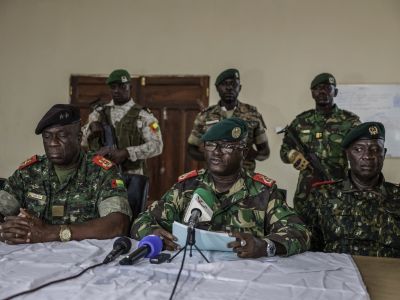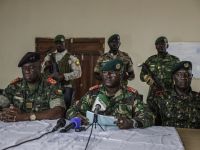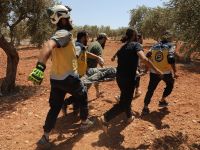Sherif Ali bin al Hussein, seeking to be crowned as king of Iraq, said the Iraqi people would move to oust Saddam Hussein immediately after the beginning of the US military strike against Iraq, anticipated within the next six months.
Following are excerpts from a telephone interview with Ali bin al Hussein speaking from London:
Q. Recently-published news reports have indicated that an American military attack on the Iraqi regime is imminent. What are your comments on these reports and what can you do to have influence in this regard? How do you see this projected strike?
A. We were hoping not to see a military strike but rather a direct support for the Iraqi people to help liberate them from oppression. We are now sure that there will be an American attack on Saddam’s regime and willingness to help the Iraqi people overthrow him.
Despite this decision by the US, we think it is possible to postpone its implementation due to international circumstances. But it has become apparent now that the aim of the American attack is to change the regime. We reiterate that the strike should not be against the Iraqi people, army or institutions but against the ruling gang.
We also hope the regime would be changed without any attack. We, as opposition, think the decision has been taken for achieving American goals without us having any effective role but we want to interact with it.
Actually, Saddam Hussein is responsible for the wars he put us in and the coming war will be the third in 20 years. It is not clear when the attack will be launched but we expect it within the next six months and it might be postponed until next March.
Military preparations for the strike are underway in the region but there is controversy in the US as to the magnitude of the strike and the Americans have always taken the Afghan case as an example despite the vast difference between Iraq and Afghanistan.
Q. What is the role of the opposition in the anticipated attack?
A. In addition to trying to alleviate the impact of the strike on the Iraqi people, army and infrastructure, the opposition has a difficult task in preventing the American forces from becoming forces of occupation. This is in addition to keeping the political decisions in the hands of the Iraqis and preventing the occurrence of an administrative vacuum after Saddam’s regime vanishes. We will also provide the basic needs of the Iraqi people and reach a common vision about the future of Iraq.
Q. What role do you expect from Jordan after its denial of participation in the potential strike?
A. We put into consideration the circumstances of Jordan which faces immense pressures whether from Iraq, the Arab public who misunderstands the real situation in Iraq or the Americans. For us as an opposition, Jordan is a very important gateway. The presence of the Iraqi opposition and the Iraqi intelligence also in Jordan is not a secret.
There is an undercover struggle between the Iraqi opposition and intelligence agencies. We always warn the opposition factions and ask them to consider Jordan the same as Iraq. I think the US might ask Jordan, possibly secretly, to participate in logistic operations but this participation will eventually be a Jordanian decision. It is apparent that the Jordanian government and the king aim at helping the Iraqi people and eliminating their suffering.
Q. The participation of Prince Hassan in the recent Iraqi military officers’ conference in London marked a new development in the relation between you and the royal family in Jordan. What does this indicate?
A. The family ties are always there and visits are reciprocal between the two sides. But as for the Iraqi political situation and the official Jordanian stance, we have always been keen not to put them in embarrassing situations particularly in view of the fact that Jordan has economic ties with Iraq.
Prince Hassan has no official position and he announced that he attended the conference in his personal capacity. He has been flexible and has his own vision in helping the Iraqi people overcome their suffering.
Q. Do you think Prince Hassan will be satisfied with this participation only or will he participate in other activities?
A. Nobody has felt the prince’s willingness to continue the process. An opportunity may arise for him to participate in other meetings or activities, but at present he has no intention to be involved in the Iraqi file. However his attendance of such meetings cannot be downplayed.
Q. But there are some reports about the prince’s aspirations to become king of Iraq.
A. The prince announced that he has no intention or aspiration to the Iraqi throne but he wants to help the Iraqi people and alleviate their suffering. The US has no plans in this regard and I do not think Jordan wants it.
Q. What is your vision regarding the relations with Jordan if you become the king of Iraq?
A. Relations between countries are linked with their mutual interests but not their family ties. If monarchy is restored in Iraq, its government should look at the Iraqi people’s interests. The Iraqi people have suffered a lot from the bad relations, which the regime in Iraq has been having with its neighbors. We want Iraq to be supportive to stability in the region and not a source of tension. The majority of Iraqis want the royal regime because this will be the umbrella for all the political, sectarian and national spectra in the country.
Q. What is the American stance towards the restoration of monarchy in Iraq?
A. Washington wants a democratic Iraq and to give the Iraqi people the freedom to choose either the republic or monarchy regime.
Q. Aren’t you concerned about the dismantling of Iraq after an American military strike?
A. I challenge if there is a single Iraqi who thinks of dismantling Iraq.
Q. Some reports have recently come to the surface talking about resettling of Palestinian refugees in Iraq. What are the possibilities for implementing such scenarios?
A. It will be difficult for Iraq to receive large numbers of people. We would welcome our Arab brothers but we do not think it is good for the Palestinians to leave their homeland and come to Iraq because they are facing aggression. Therefore, we do not encourage the Palestinians to leave their lands and come to Iraq. We know the meaning of being a refugee and so we do not want new refugees in our country. (Albawaba.com)









